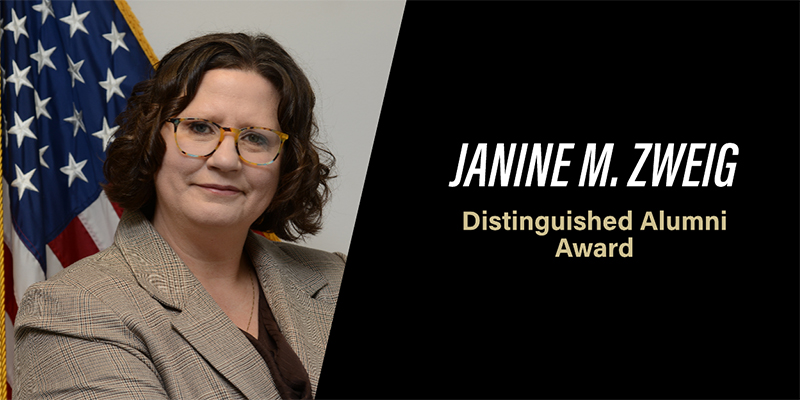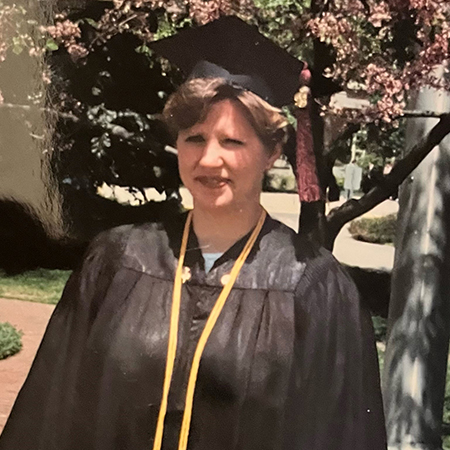HHS Distinguished Alumna leaves lasting influence in criminal justice, sexual assault research
Written By: Rebecca Hoffa, rhoffa@purdue.edu

Purdue University Human Development and Family Science and Psychological Sciences alumna Janine Zweig’s passion for helping sexual assault survivors and those who have had other victimizing experiences has shaped her more than 25-year career.
As a researcher, Zweig uncovered new knowledge related to sexual violence, intimate partner violence, juvenile justice reform and other behavioral health-focused interventions in the criminal justice system. Now, serving as executive science advisor at the National Institute of Justice (NIJ), Zweig goes beyond her own research to help shape the research agenda for the agency and provide oversight across all five NIJ science offices: Investigative and Forensic Sciences, Violence and Victimization Prevention, Technology and Standards, Criminal Justice Systems, and Crime Prevention and Youth Justice.
“NIJ was one of my biggest funders over the course of my career, so now to be on the other side of the fence, guiding the investments and helping them set their research agendas, that’s something that is really cool and exciting: to determine ‘What don’t we know? What’s left to know in certain areas and what do we really need to lean in on? What might we ask the research community to propose so we can get those questions answered?’” Zweig said.

Janine Zweig stands on campus in her cap and gown after graduating from Purdue with a bachelor’s degree in child development and family studies and psychology.(Photo provided)
A 2024 College of Health and Human Sciences Distinguished Alumna, Zweig is being recognized for her significant leadership and influential research accomplishments.
“I’m very honored, and I almost can’t believe it,” Zweig said. “I am really grateful that Purdue values what I’ve done over the course of my career and appreciates what I’ve done to then give me this award.”
At Purdue, Zweig earned bachelor’s degrees in child development and family studies (CDFS) — now developmental and family science — and psychology. She then went on to earn a master’s degree and PhD from Penn State University in human development and family studies. It was during the course of her education that she set her sights on a career in research in an applied setting.
“These disciplines completely have informed what I do routinely,” Zweig said. “The research on survivors and their well-being, the focus on juvenile justice reform — a developmental background is extraordinarily important to really understand plasticity and change across the life span.”
During her 24 years at the Urban Institute in Washington, D.C., Zweig did significant work around sexual assault medical forensic exams and how states pay for them, bringing to light how victims might be billed in error or how certain aspects of the exam might not be covered. Her work has helped make the process smoother for survivors of sexual assault.
Zweig also did a significant stretch of work at the Urban Institute with the National Sexual Violence Resource Center when she explored rideshare experiences and harassment. The categorization system she collaborated in developing helped Uber identify that both riders and drivers experienced sexually harassing and victimizing experiences at similar rates, which provided a significant narrative shift from what had been portrayed in the media about rideshare services being unsafe for passengers in the late 2010s.
“I really felt passionate about my areas of research,” Zweig said. “The portfolio I had about the response to sexual assault felt meaningful and as if I was making contributions to help ensure that survivors had services that they needed or were being provided with things like rape kits and exams free of charge.”
In addition to her work in sexual assault, Zweig made contributions through a longitudinal study that looked at victimization for people leaving correctional facilities. The study showed victimization experiences, which include abuse and assault, influenced individuals’ mental health and directly related to substance use relapse and reoffending criminal behavior once they returned to their communities.
“I feel like that’s one my most important contributions to more of the theoretical world, but it has direct implications for how we help people,” Zweig said.
Zweig noted she wouldn’t have had the same level of knowledge of the industries for which she was conducting the research if it hadn’t been for her required internship in her child development and family studies major. Choosing to work in a women’s crisis shelter, Zweig developed a new appreciation of how the research is applied in the field.
“I think having been required to do that gave me a different understanding of the on-the-ground work,” Zweig said. “I think that lens has served me very well over the course of my career and has made me connect with stakeholders in the field and partner with practitioners in really meaningful ways.”
Ultimately, Zweig credits Purdue with helping her carve a career that’s had such an impact.
“If I didn’t have the faculty in CDFS investing in me as a person the way they did, I don’t know if I would have realized I had an interest in or the capability to do a PhD,” Zweig said. “They taught me I was capable to do this, that I could follow that path and be successful at it.”
Discover more from News | College of Health and Human Sciences
Subscribe to get the latest posts sent to your email.